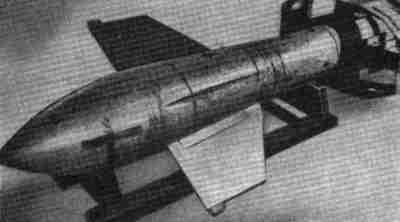Ruhrstahl/Kramer X-1 (Fritz X, SD 1400)
|
The sudden but arranged capitulation of the Italian fleet to the
Allies on 9 September 1943 spurred the Germans to take quick
actions against their former ally. The battleship Italia
was damaged and Roma sunk as victims of a new type of
air-to-surface missile -- the Ruhrstahl/Kramer X-1 or Fritz X. It
was a free-falling bomb guided by the parent aircraft. Usually it
was dropped at an altitude of about 6,000m; by the time of
detonation it would have had gained a velocity close to that of
sound. The control apparatus comprised of electromagnetically operated spoilers activated in sympathy with radio signals from the parent aircraft (often a Dornier Do 217). After dropping the Fritz X, the airplane would have its motors throttled back and be flown to a higher altitude directly above the target, thus enabling the observer to guide the missile with a conventional Lofte 7 bombsight. Direct wire-link control using transmission lines up to 8km long was also possible. However, it was later abandoned for economic reasons. The first tests were conducted in Germany in 1942 and were moved to Italy later. There pneumatic power was tested to substitute for the electromagnetic actuation of the spoilers. However, variations in temperature in different parts of the atmosphere posed obstacles and the idea had to be dropped. The Allied advance to Italy forced the Germans to press the Fritz X into increased use. The cruiser USS Savannah was attacked successfully alongside several naval transports. During a night attack two British cruisers collided in utmost confusion. Seven days later the Germans scored hits on the battleship HMS Warspite, which had to be towed to Malta. Each month about 66 of these guided bombs were manufactured, far fewer than the projected figure. About half of the bombs were consumed by tests done during 1943 and 1944. The real obstacle to the success of the Fritz X was not the low production rate, but the substantial loss suffered by the deliverer aircraft. The parent planes were very vulnerable because fairly slow speed was needed over the target area. |


